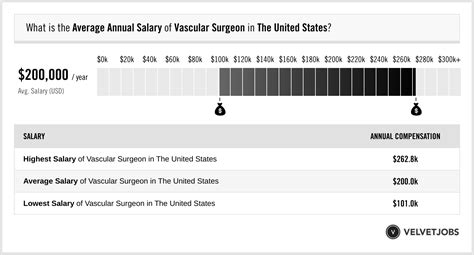Intro
Vascular surgery is a highly specialized field that requires a great deal of education, training, and expertise. As a result, vascular surgeons are in high demand and can command high salaries. If you're considering a career in vascular surgery, it's essential to understand the job market, salary ranges, and growth opportunities.
The demand for vascular surgeons is increasing due to the growing prevalence of vascular diseases, such as peripheral artery disease, aortic aneurysms, and varicose veins. According to the Society for Vascular Surgery, the number of vascular surgeons in the United States is expected to increase by 20% by 2025. This growth is driven by an aging population, an increase in obesity and diabetes, and advances in medical technology.

Types of Vascular Surgery Jobs
There are several types of vascular surgery jobs, including:
1. Vascular Surgeon
Vascular surgeons are trained to diagnose and treat diseases of the arteries, veins, and lymphatic vessels. They perform surgical procedures, such as angioplasty, stenting, and bypass grafting, to restore blood flow and relieve symptoms.
2. Endovascular Surgeon
Endovascular surgeons specialize in minimally invasive procedures, such as angioplasty and stenting, to treat vascular diseases. They use imaging technologies, such as ultrasound and fluoroscopy, to guide catheters and instruments through blood vessels.
3. Vascular Surgery Fellow
Vascular surgery fellows are trained surgeons who are pursuing additional specialized training in vascular surgery. They work under the supervision of experienced vascular surgeons to gain hands-on experience and develop their skills.
4. Vascular Surgery Nurse Practitioner
Vascular surgery nurse practitioners work with vascular surgeons to provide pre- and post-operative care to patients. They conduct physical exams, take medical histories, and develop treatment plans.
Vascular Surgery Salaries
Vascular surgery salaries vary depending on factors, such as location, experience, and type of employer. Here are some approximate salary ranges for vascular surgery jobs:
1. Vascular Surgeon
- Median salary: $621,000 per year (according to Medscape's 2022 Physician Compensation Report)
- Starting salary: $450,000 per year
- Top-end salary: $800,000 per year

2. Endovascular Surgeon
- Median salary: $550,000 per year
- Starting salary: $400,000 per year
- Top-end salary: $700,000 per year
3. Vascular Surgery Fellow
- Median salary: $60,000 per year (according to the Society for Vascular Surgery)
- Starting salary: $50,000 per year
- Top-end salary: $70,000 per year
4. Vascular Surgery Nurse Practitioner
- Median salary: $110,000 per year (according to the Bureau of Labor Statistics)
- Starting salary: $90,000 per year
- Top-end salary: $130,000 per year
Benefits of a Career in Vascular Surgery
A career in vascular surgery offers many benefits, including:
1. High Salary Potential
Vascular surgeons are among the highest-paid medical professionals, with median salaries ranging from $450,000 to over $800,000 per year.
2. Job Security
The demand for vascular surgeons is increasing, ensuring job security and opportunities for advancement.
3. Variety of Procedures
Vascular surgeons perform a wide range of procedures, from minimally invasive angioplasty to complex open surgeries.
4. Opportunity to Improve Patient Outcomes
Vascular surgeons have the opportunity to make a significant impact on patient outcomes, improving quality of life and reducing morbidity and mortality.
Challenges of a Career in Vascular Surgery
A career in vascular surgery also presents several challenges, including:
1. High Level of Education and Training
Vascular surgeons require a minimum of 10-12 years of education and training after high school.
2. High-Stress Environment
Vascular surgeons work in high-stress environments, making life-or-death decisions and performing complex procedures.
3. Long Hours and Irregular Schedules
Vascular surgeons often work long hours, including night shifts, weekends, and holidays.
4. Continuous Education and Training
Vascular surgeons must stay up-to-date with the latest technologies and techniques, requiring continuous education and training.
Conclusion
A career in vascular surgery offers many benefits, including high salary potential, job security, and the opportunity to improve patient outcomes. However, it also presents several challenges, including a high level of education and training, a high-stress environment, and long hours. If you're considering a career in vascular surgery, it's essential to weigh the pros and cons and determine if this field is right for you.
What is the average salary for a vascular surgeon?
+The average salary for a vascular surgeon is around $621,000 per year, according to Medscape's 2022 Physician Compensation Report.
How long does it take to become a vascular surgeon?
+It typically takes a minimum of 10-12 years of education and training after high school to become a vascular surgeon.
What are the benefits of a career in vascular surgery?
+The benefits of a career in vascular surgery include high salary potential, job security, and the opportunity to improve patient outcomes.
